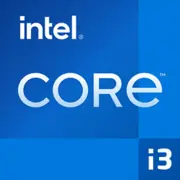Intel Core i3-3229Y

Intel Core i3-3229Y: Legacy Ultrabook Architecture in the Reality of 2025
Analysis of the processor's capabilities and relevance for modern tasks
Architecture and Process Technology: The Legacy of Ivy Bridge
The Intel Core i3-3229Y, released in 2013, belongs to the third generation of Ivy Bridge architecture. It is one of the first Intel chips manufactured using the 22-nanometer process, which allowed for reduced power consumption and improved transistor integration compared to its predecessors (Sandy Bridge, 32 nm).
- Cores and Threads: 2 cores with Hyper-Threading support (4 threads). Base frequency is 1.4 GHz, turbo mode is absent (the i3 line of that generation did not support Turbo Boost).
- Integrated Graphics: Intel HD Graphics 4000 with a frequency of 350–850 MHz. Supports DirectX 11, OpenGL 4.0, and resolutions up to 2560×1600. In 2025, this is sufficient only for basic tasks: rendering the interface, HD video playback, simple 2D games.
Architecture Features:
- Improved power consumption control due to three-dimensional transistors (3D Tri-Gate).
- Supports PCI Express 2.0 and up to 16 GB DDR3-1600 MHz.
Power Consumption and TDP: Compactness at the Expense of Power
With a TDP of 13 Watts, the i3-3229Y is a typical solution for ultrabooks and compact laptops from 2013 to 2015. For comparison:
- Modern Intel Core U-series (2025) has a TDP of 15 Watts but delivers 3–4 times higher performance.
- A TDP of 13 Watts allows for passive cooling or a miniature fan, which is critical for slim enclosures.
The Problem in 2025: Even budget processors (such as the Intel N-series or AMD Athlon Silver) with similar TDP offer better multitasking capabilities thanks to 4–6 cores and modern process technologies (6–7 nm).
Performance: What Can the i3-3229Y Do in 2025?
Tests show that the processor handles basic tasks but hits limitations due to its two cores:
1. Office Work:
- Microsoft Office, Google Workspace — comfortable handling of documents and spreadsheets.
- Opening 10+ tabs in Chrome simultaneously (with 8 GB RAM) causes slowdowns.
2. Multimedia:
- Playback of 1080p video (YouTube, local files) — no issues.
- 4K video — stutters even in VLC with hardware acceleration.
3. Gaming:
- Older games: Half-Life 2, Minecraft (low settings) — 30–40 FPS.
- Modern projects (even indie titles) — not recommended.
Turbo Mode: Absent. Frequency is fixed at 1.4 GHz, which limits peak performance.
Usage Scenarios: Who Is This Processor Relevant For in 2025?
The i3-3229Y is suitable only for narrow tasks:
- Budget Devices: Laptops priced at $200–300 (new but with outdated components).
- Secondary Market: Used models ($80–150) for basic needs.
- Special Tasks: Terminals for offices, educational projects (e.g., Chromebook analogs running Linux).
Not Suitable For:
- Gamers, designers, programmers.
- Users working with streaming video or VR.
Battery Life: Balancing Runtime and Performance
Modern laptops with the i3-3229Y (if any are still made) are equipped with batteries of 35–40 Wh. In 2025, considering battery wear, theoretically:
- Web browsing: 5–6 hours.
- Video: 4–5 hours.
- Power-saving mode (e.g., in Linux with background processes disabled): up to 7 hours.
Power-Saving Technologies:
- Intel SpeedStep — dynamic frequency management.
- C-states (deep sleep states for cores during idle).
However, the absence of support for modern standards (e.g., Windows 11 with its optimizations) reduces efficiency.
Comparison with Competitors: In the Context of Past and Present
1. AMD from 2013:
- A4-5000 (4 cores, TDP 15 W). Better for multi-threaded tasks but weaker in single-thread performance.
2. Modern Analogues (2025):
- Intel N100 (4 cores, 6 W TDP, 7 nm) — 2–3 times faster, laptops priced from $250.
- AMD Ryzen 3 7320U (4 cores/8 threads, 15 W) — ideal for office work and light creativity.
Apple M1: Even the base M1 (2020) outperforms the i3-3229Y by 5–7 times in performance at a similar TDP.
Pros and Cons: Why This Is a Controversial Choice in 2025
Strengths:
- Low cost of devices.
- Sufficient for basic tasks (text, video, browsing).
- Compactness and silence of systems.
Weaknesses:
- No support for AVX2, USB 3.1, Wi-Fi 6.
- Maximum 16 GB DDR3 (versus 32 GB DDR5 in modern models).
- Outdated graphics (HD 4000 vs. Iris Xe or Radeon 680M).
Laptop Selection Recommendations: What to Look For in 2025
If you're considering a device with the i3-3229Y, check:
1. Device Type: Ultrabook or budget laptop with a diagonal of 11–14 inches.
2. Upgrade:
- SSD (even SATA) is essential instead of an HDD.
- Minimum of 8 GB RAM (DDR3).
3. Display: IPS matrix with a resolution of 1920×1080 — less strain on the eyes.
4. Ports: USB 3.0, HDMI — for peripheral connections.
Important: New laptops with this CPU are rarely found. Look for refurbished models with a warranty or consider alternatives (Intel N series, AMD Ryzen 3).
Final Conclusion: Who Is the i3-3229Y Suitable For in 2025?
This processor is a choice for those who need:
- Ultra-budget laptop for text work and internet use.
- Backup device for travel (not too precious to lose or break).
- Experimental equipment (installing lightweight OS like Linux Lite).
Key Benefits:
- Price below $150 on the secondary market.
- Reliability (when replacing the HDD with an SSD).
However, for most users in 2025, even budget newcomers (e.g., Chuwi Minibook X with N100) will be a better investment.
Basic
CPU Specifications
Memory Specifications
GPU Specifications
Miscellaneous
Benchmarks
Compared to Other CPU
Share in social media
Or Link To Us
<a href="https://cputronic.com/cpu/intel-core-i3-3229y" target="_blank">Intel Core i3-3229Y</a>